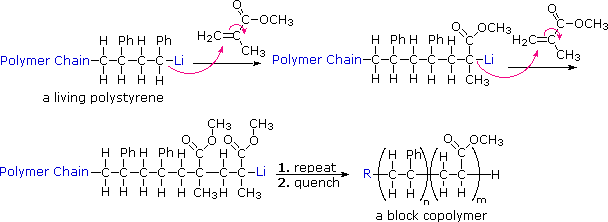Making The Most Of the Possible of Polymers: Discover the Diverse Benefits and Practical Makes Use Of
The diverse advantages and functional usages of polymers continue to progress, supplying innovative remedies to intricate challenges. By checking out how polymers can improve item resilience, drive sustainability efforts, revolutionize healthcare options, and lead the way for future technological improvements, we can reveal a world of possibilities waiting to be taken advantage of.
Relevance of Polymers in Modern Industries
Polymers play a critical duty in modern-day sectors, acting as flexible materials that drive development and effectiveness throughout a large range of sectors. These complex molecules, composed of repeated subunits, have transformed markets such as vehicle, aerospace, electronic devices, medical care, and extra. In the auto sector, polymers have enabled the development of lightweight yet resilient components, improving fuel effectiveness and total efficiency. Aerospace sectors rely on polymers for their high strength-to-weight ratio, vital for airplane and spacecraft building. The electronics market take advantage of the protecting homes of polymers, essential for producing motherboard and digital devices (Polymers). Additionally, polymers are extensively utilized in the medical care market for drug shipment systems, medical gadgets, and biocompatible products. Their flexibility, resilience, and cost-effectiveness make polymers vital in contemporary production procedures, fostering improvements and driving progress in various sectors worldwide. Accepting the possibility of polymers is crucial to unlocking further innovations and addressing the advancing demands these days's industrial landscape.
Enhancing Item Sturdiness With Polymers
With a concentrate on longevity and strength, integrating sophisticated polymer technologies right into item design has actually come to be a cornerstone of improving durability in contemporary production procedures. Polymers provide a large range of residential or commercial properties that add to the total durability of products. One essential advantage is their resistance to rust, chemicals, and weathering, making them suitable for usage in numerous sectors where exposure to harsh conditions prevails.
In addition, polymers can be tailored to meet specific toughness needs, permitting suppliers to tailor items according to their planned usage and anticipated life expectancy. By integrating polymers right into product elements, producers can improve stamina and impact resistance, decreasing the possibility of breakage or wear over time.
Additionally, polymers are light-weight yet tough, giving longevity without including unneeded weight to products. This characteristic is particularly beneficial in sectors such as aerospace and auto, where light-weight materials are important for enhancing fuel efficiency and total efficiency.
Sustainability Improvements With Polymer Development
In the realm of modern production and product design, the cutting-edge application of polymers is driving substantial improvements in sustainability practices. Polymer innovation plays an essential role in boosting sustainability by using options that decrease environmental impact throughout different markets. One key site facet where polymers stand out is in enabling the growth of light-weight yet resilient products that add to fuel performance in transportation and decrease total energy consumption. In addition, the recyclability and biodegradability of specific polymers further advertise lasting methods by minimizing waste and air pollution.
Moreover, innovations in polymer innovation have brought about the development of bio-based and eco-friendly polymers, obtained from all-natural resources such as plants, that offer a more sustainable option to typical petroleum-based plastics. These environment-friendly polymers not just help decrease reliance on fossil gas yet additionally decrease greenhouse gas emissions during production. By integrating these ingenious polymers right into making procedures, firms can lower their environmental footprint and move towards more sustainable practices, aligning with global efforts to combat climate change and promote a circular economy.
Polymers in Healthcare: Revolutionizing Medical Solutions

Among the crucial areas where polymers are making significant strides remains in the growth of targeted drug distribution systems. By encapsulating medicines within polymeric nanoparticles or micelles, researchers can boost medication stability, improve bioavailability, and make it possible for regulated release, resulting in more effective therapy programs with decreased negative effects.
Furthermore, polymers contribute in the field of regenerative medicine, where they are used this contact form to develop scaffolds that imitate the extracellular matrix, providing assistance for cell growth and cells regeneration. This modern technology holds enormous promise for fixing damaged body organs, promoting injury healing, and progressing individualized medicine methods.
Fundamentally, the assimilation of polymers in medical care is driving advancement, boosting treatment efficacy, and eventually improving individual outcomes in methods formerly thought unattainable.
Future Applications and Technologies in Polymer Innovation
Advancing at the center of clinical exploration, polymer modern technology proceeds to lead the way for groundbreaking applications and developments forming diverse markets. In the world of sustainable packaging, biodegradable polymers are acquiring grip as eco-friendly options to typical plastics. These polymers break down naturally, minimizing the ecological influence of single-use items. Additionally, in the area of electronics, conductive polymers are transforming wearable modern technology and flexible electronics. Their unique why not find out more properties permit the advancement of stretchable circuits and sensors, allowing brand-new opportunities in medical care monitoring and smart clothing. Additionally, polymer nanocomposites are improving the mechanical and thermal residential properties of products, bring about more powerful and lighter components in aerospace and automotive industries. Looking ahead, researchers are checking out the capacity of shape-memory polymers for applications in robotics and biomedical gadgets, where materials that can "keep in mind" and return to their initial shapes use interesting opportunities for innovation. As polymer technology remains to progress, the future holds limitless opportunities for groundbreaking developments throughout numerous sectors.
Verdict
